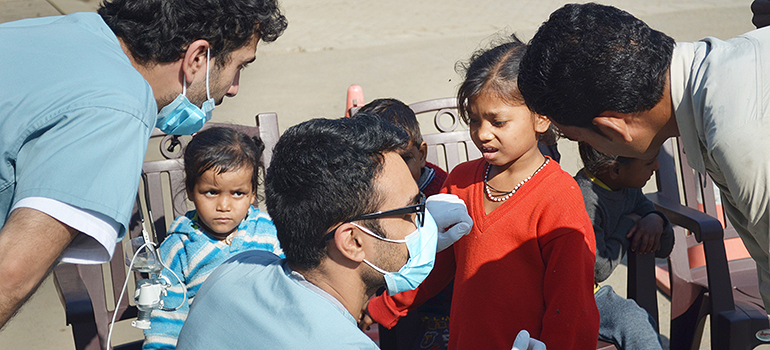A volunteer dentistry mission to India has taught four UBC students to see the whole patient—including his or her social and economic context, cultural beliefs and values—not just the ailing tooth.
In December, fourth-year dentistry students Akashdeep Villing, Amandeep Hans, Vikrant Sharma and third-year student Tanmeet Singh arrived in India to set up dental camps at local factories and elementary schools (see sidebar). They had intended to provide straightforward dental check-ups and extractions, but learned that to get to the tooth, you’ve got to get the patient to open up first.
The four set off on their adventure on their own accord after meeting a visitor to UBC Dentistry from India, who spoke of the unmet dental needs prevalent in his country.
“Returning to the country that raised our parents and shaped much of our lives was a great experience. The dentistry we were able to perform was also a blessing.”
The workers they were serving make on average $20 a month and dental health is a low priority. “Many patients refused to have infected root tips and even loose teeth extracted,” says Villing.
“We could not use long-term consequences to convince patients to treat their infections, instead they thought strictly in the short term,” says Villing. “‘If you take it out, will it hurt today?’ was their most pressing concern.”
With the help of the Baba Jaswant Singh Dental College in Ludhiana, Punjab, the Punjabi speaking UBC students set up a clinic at a factory on the outskirts of the city and completed more than 70 check-ups, offering advice and counselling about oral health and future dental problems.
“Workers were astounded that we travelled such a long distance at our own expense to offer free dentistry to them,” Hans says. “That gave us some social credibility to offer advice as well.”
UBC Dentistry team at elementary school
In addition to the factory clinics, the UBC Dentistry team also staged their dental camp at a local elementary school. Oral hygiene education played a large role with the children, many of whom suffered from ectopic eruptions (permanent teeth growing before baby teeth fall out), poor hygiene and retained decayed primary teeth. They found children more receptive and eager to make changes. Parents were also receptive to advice about the necessity of orthodontic intervention. The team has tentative plans to return to the school and set up a full restoration camp.
Before the trip, Hans thought offering treatment for pain relief would be a piece of cake—that people would jump at the opportunity to trade long-term pain for short-term discomfort.
“Instead, we were bombarded with requests for teeth-whitening,” says Hans. “Most people refused treatment such as an extraction but were open to basic advice on proper brushing because it promised whiter teeth.”
Yet, the team was not dissuaded. To be effective Hans took a step back in himself to gauge the knowledge of his patients; he could not assume they had a basic understanding about oral health or the seriousness of dental decay, and simply comply with treatment. He worked with patients on their terms, understanding their references.
“We realized that we couldn’t change their whole belief system overnight,” Villing adds. “But we did feel that we had a positive impact.”
That meant knowing a seed was planted about the awareness and importance of oral health.
“Returning to the country that raised our parents and shaped much of our lives was a great experience,” he says. “The dentistry we were able to perform was also a blessing.”
After his experience in India, Hans says he’s more prepared to work with a broader population of patients, especially in other countries as a volunteer dentist. “A practitioner has to consider the social dynamics at play and in our case in India, having white teeth was deemed more valuable than basic treatment. We need to understand those we serve, and learn from them.”
Dentistry students “cut their teeth” in volunteer dentistry throughout their four years at UBC in the faculty’s Community Volunteer Clinic Program as well as with outside groups such as the Dental Mission Project, run by DMD 1972 alumnus Dr. Doug Nielsen. Community service learning opportunities build confidence and help foster a lifetime of global citizenship.

